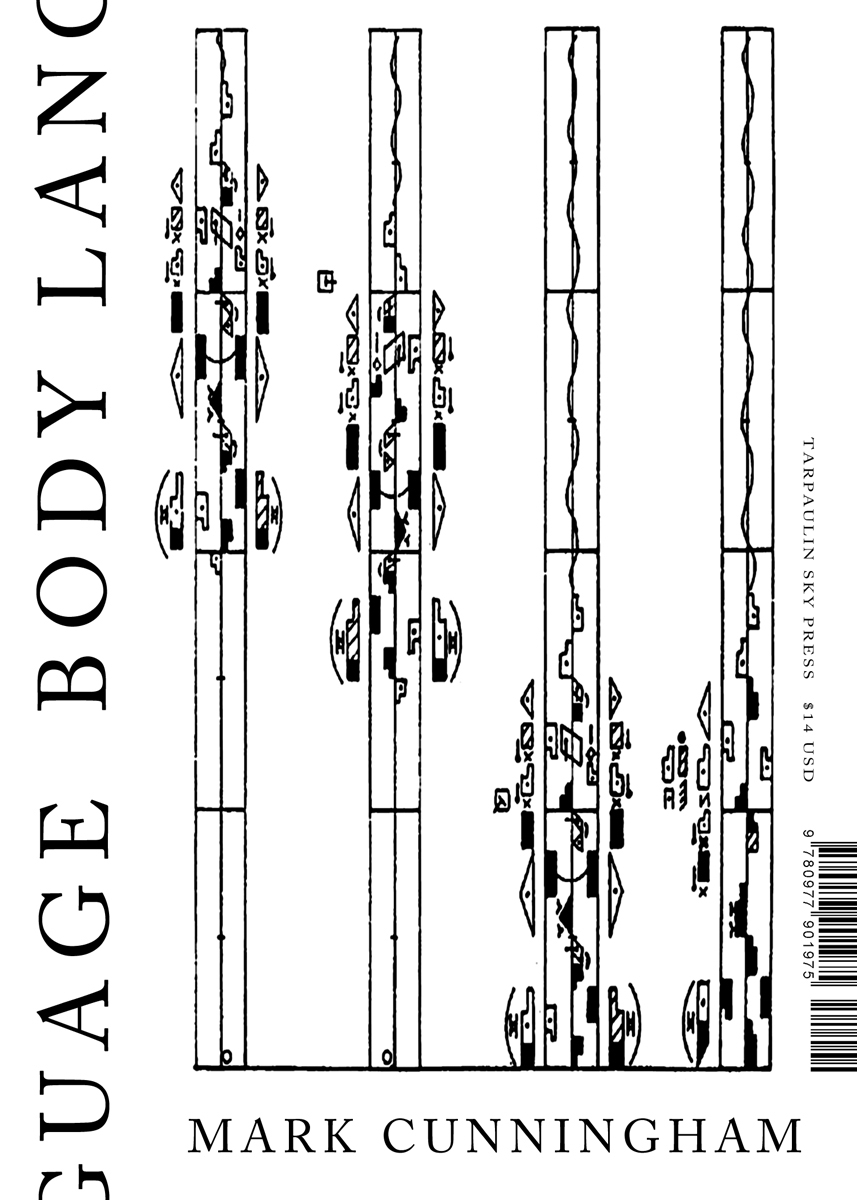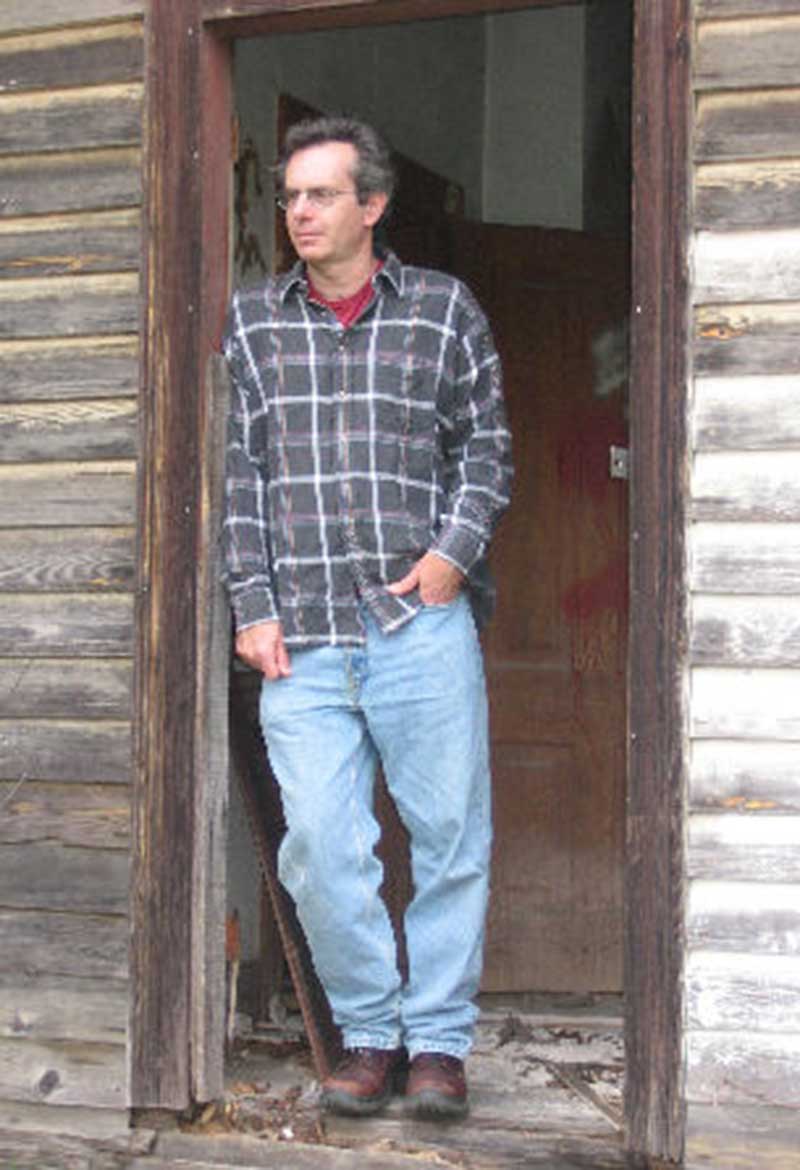
Body Language / Primer
by Mark Cunningham
Prose Poetry. 136 pages. Paperback. Tête-bêche. 2008
Two full-length collections of prose poems contained in Body Language, one titled Body (on parts of the body) and one titled Primer (on numbers and letters), together form a diptych investigating the body in language and language in the body.

Body Language / Primer
by Mark Cunningham
Prose Poetry. 136 pages. Paperback. Tête-bêche. 2008
Two full-length collections of prose poems contained in Body Language, one titled Body (on parts of the body) and one titled Primer (on numbers and letters), together form a diptych investigating the body in language and language in the body.
What would a collection on the body be without works like “The Male Nipple,” “The Bruise” and “The Fart”? Most of the poems in Body retain the feel of a riddle and, while they are necessarily less heady than the works of Primer, are by turns enigmatic, light and thoughtful. “Breath” does a wonderful job of addressing a rather elusive topic, doing so in unexpected fashion: “In quiet moments, you hear it, the static between you and all things.” The appeal of Body Language is universal. Always thought-provoking, always enjoyable and unexpected, the combination of topics of math, language and symbolism via the alphabet and the body as a complex system, turns out to be an appropriate, engaging compendium. (Cynthia Reeser, Prick of the Spindle) Body Language weaves through a brain-scrambling obstacle course not unlike what one perceives pin wheeling through Hunter S. Thompson’s imagination — though Cunningham’s use of language shows respect for humans, and the human body, by leaps and bounds more than Gonzo ultimately did. Yet Body Language remains accessible without being easy, like Jeopardy. We watch — or in this case read — to see how smart we are. Cunningham tests what allusions, anecdotes, punch lines you know, be they liturgical, canonical, numerical, numerological, historical, mystical, magical, simple, or other…. It’s funny, sad and serious. Ultimately, reflective…. An impressive collection of thoughts and poetic prose, Body Language is a great choose-your-own adventure. There’s something for us all. And that’s fun. (Steven Karl, The Adirondack Review) In Mark Cunningham’s asymptotic collection, two discreet texts, Body and Primer, form a provocative, loopic continuum in which prose poems “defining” body parts (The Spleen, The Pituitary Gland, The Pimple, The Thumb) mesh with an abecedarium/cipher concerning topics as various as fate, reality, and phenomenology. With its trope of clue-like instruction and unique, flip-book embodiment, Cunningham‘s book creates a kind of hybrid detective f(r)iction, an intrepid mash-up of high and low cultures in which the reader is as likely to encounter Rilke and Proto-Sinaitic inscription as Lacan, Film Noir, The Three Stooges, cell phones, higher mathematics, binary thought, and Coyote and Road Runner cartoons. Cunningham pitches with surprising clarity the most abstract meditations (“The sperm cell is the first zero. The vagina the second. Wait—before you floated in the placenta (the third), your mother floated and your father floated in theirs, and before them their others and their fathers . . . . You get dizzy, as in that moment in Citizen Kane when Kane pauses after leaving his wife’s bedroom and image after image recedes in mirror reflecting mirror. Another thing about DNA: if space curves, so does time,” for example, from “O as a Beginning”), offering in almost reportorial style a (d)evolutionary mix of anachronistic, equally relentless somatic and figurative explorations of the body (“a paradise of sorts”) and the mind. Northrop Frye called a riddle “essentially a charm in reverse . . . the revolt of the intelligence against the hypnotic power of commanding words.” Cunningham’s work moves in this direction; as Frye would put it, “Poem and object are very quizzically related: there seems to be some riddle behind all riddles which we have not yet guessed.” These poems are not the mere game-playing of an extraordinarily gifted and restless intellect; stalked by pain, fear, guilt, and the burden of awareness,, they can also be tender, betraying a capacity for happiness: “I rarely talk about myself, but I’ll tell you this: one of the best days I’ve had was when I passed a cinema and decided right then to see The Cameraman. Another time, I switched restaurants at the last minute, and met an acquaintance there, and ate with her, and three years later we’re still going out.” As obsessed as they are with the ironies and processes of mind and body, the poet’s concern is ever with the mysteries this human armature holds up: “life itself.” (Lisa Russ Spaar)
What would a collection on the body be without works like “The Male Nipple,” “The Bruise” and “The Fart”? Most of the poems in Body retain the feel of a riddle and, while they are necessarily less heady than the works of Primer, are by turns enigmatic, light and thoughtful. “Breath” does a wonderful job of addressing a rather elusive topic, doing so in unexpected fashion: “In quiet moments, you hear it, the static between you and all things.” The appeal of Body Language is universal. Always thought-provoking, always enjoyable and unexpected, the combination of topics of math, language and symbolism via the alphabet and the body as a complex system, turns out to be an appropriate, engaging compendium. (Cynthia Reeser, Prick of the Spindle) Body Language weaves through a brain-scrambling obstacle course not unlike what one perceives pin wheeling through Hunter S. Thompson’s imagination — though Cunningham’s use of language shows respect for humans, and the human body, by leaps and bounds more than Gonzo ultimately did. Yet Body Language remains accessible without being easy, like Jeopardy. We watch — or in this case read — to see how smart we are. Cunningham tests what allusions, anecdotes, punch lines you know, be they liturgical, canonical, numerical, numerological, historical, mystical, magical, simple, or other…. It’s funny, sad and serious. Ultimately, reflective…. An impressive collection of thoughts and poetic prose, Body Language is a great choose-your-own adventure. There’s something for us all. And that’s fun. (Steven Karl, The Adirondack Review) In Mark Cunningham’s asymptotic collection, two discreet texts, Body and Primer, form a provocative, loopic continuum in which prose poems “defining” body parts (The Spleen, The Pituitary Gland, The Pimple, The Thumb) mesh with an abecedarium/cipher concerning topics as various as fate, reality, and phenomenology. With its trope of clue-like instruction and unique, flip-book embodiment, Cunningham‘s book creates a kind of hybrid detective f(r)iction, an intrepid mash-up of high and low cultures in which the reader is as likely to encounter Rilke and Proto-Sinaitic inscription as Lacan, Film Noir, The Three Stooges, cell phones, higher mathematics, binary thought, and Coyote and Road Runner cartoons. Cunningham pitches with surprising clarity the most abstract meditations (“The sperm cell is the first zero. The vagina the second. Wait—before you floated in the placenta (the third), your mother floated and your father floated in theirs, and before them their others and their fathers . . . . You get dizzy, as in that moment in Citizen Kane when Kane pauses after leaving his wife’s bedroom and image after image recedes in mirror reflecting mirror. Another thing about DNA: if space curves, so does time,” for example, from “O as a Beginning”), offering in almost reportorial style a (d)evolutionary mix of anachronistic, equally relentless somatic and figurative explorations of the body (“a paradise of sorts”) and the mind. Northrop Frye called a riddle “essentially a charm in reverse . . . the revolt of the intelligence against the hypnotic power of commanding words.” Cunningham’s work moves in this direction; as Frye would put it, “Poem and object are very quizzically related: there seems to be some riddle behind all riddles which we have not yet guessed.” These poems are not the mere game-playing of an extraordinarily gifted and restless intellect; stalked by pain, fear, guilt, and the burden of awareness,, they can also be tender, betraying a capacity for happiness: “I rarely talk about myself, but I’ll tell you this: one of the best days I’ve had was when I passed a cinema and decided right then to see The Cameraman. Another time, I switched restaurants at the last minute, and met an acquaintance there, and ate with her, and three years later we’re still going out.” As obsessed as they are with the ironies and processes of mind and body, the poet’s concern is ever with the mysteries this human armature holds up: “life itself.” (Lisa Russ Spaar)
About the Author
Mark Cunningham lives in central Missouri and is the author of Body Language, from Tarpaulin Sky Press. He is also the author of 80 Beetles (Otoliths) and several ebooks: 10 specimens (Gold Wake Press), 71 Leaves (BlazeVox), Nachträglichkeit (Beard of Bees), Second Story (Right Hand Pointing), and nightlightnight, with photographs by Mel Nichols, also from Right Hand Pointing.


About the Author
Mark Cunningham lives in central Missouri and is the author of Body Language, from Tarpaulin Sky Press. He is also the author of 80 Beetles (Otoliths) and several ebooks: 10 specimens (Gold Wake Press), 71 Leaves (BlazeVox), Nachträglichkeit (Beard of Bees), Second Story (Right Hand Pointing), and nightlightnight, with photographs by Mel Nichols, also from Right Hand Pointing.